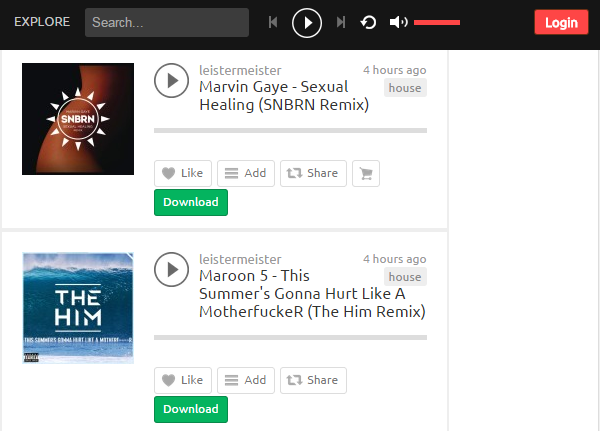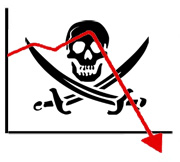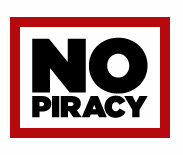Sweden’s Largest Streaming Site Will Close After Raid
mercredi 29 juillet 2015 à 09:58 While millions associate Sweden with BitTorrent through its connections with The Pirate Bay, over the past several years the public has increasingly been obtaining its content in other ways.
While millions associate Sweden with BitTorrent through its connections with The Pirate Bay, over the past several years the public has increasingly been obtaining its content in other ways.
Thanks to cheap bandwidth and an appetite for instant gratification, so-called streaming portals have grown in popularity, with movies and TV shows just a couple of clicks away in convenient Netflix-style interfaces.
Founded in 2011, Swefilmer is currently Sweden’s most popular streaming movie and TV show site. Research last year from Media Vision claimed that 25% of all web TV viewing in the country was carried out on Swefilmer and another similar site, Dreamfilm.
According to Alexa the site is currently the country’s 100th most popular domain, but in the next three days it will shut down for good.

The revelation comes from the site’s admin, who has just been revealed as local man Ola Johansson. He says that a surprise and unwelcome visit made it clear that he could not continue.
In a YouTube video posted yesterday, Johansson reports that earlier this month he was raided by the police who seized various items of computer equipment and placed him under arrest.
“It’s been a tough month to say the least. On 8 July, I received a search by the police at home. I lost a computer, mobile phone and other things,” Johansson says.
While most suspects in similar cases are released after a few hours or perhaps overnight, Johansson says he was subjected to an extended detention.
 “I got to sit in jail for 90 hours. When I came out on Monday [after being raided on Wednesday] the site had been down since Friday,” he explains.
“I got to sit in jail for 90 hours. When I came out on Monday [after being raided on Wednesday] the site had been down since Friday,” he explains.
The Swede said he noticed something was amiss at the beginning of July when he began experiencing problems with the Russian server that was used to host the site’s videos.
“It started when all things from OK.ru disappeared. That’s the service where we have uploaded all the videos,” Johansson says.
While the site remains online for now, the Swede says that this Friday Swefilmer will close down for good. The closure will mark the end of an era but since he is now facing a criminal prosecution that’s likely to conclude in a high-profile trial, Johansson has little choice but to pull the plug.
The site’s considerable userbase will be disappointed with the outcome but there are others that are welcoming the crackdown.
“We are not an anonymous Hollywood studio,” said local director Anders Nilsson in response to the news.
“We are a group of film makers and we will not give up when someone spits in our faces by stealing our movies and putting them on criminal sites to share them in the free world. It is just as insulting as if someone had stolen the purely physical property.”
Aside from creating a gap in the unauthorized streaming market, the forthcoming closure of Swefilmer will have repercussions in the courtroom too, particularly concerning an important legal process currently playing out in Sweden.
Last November, Universal Music, Sony Music, Warner Music, Nordisk Film and the Swedish Film Industry filed a lawsuit in the Stockholm District Court against local ISP Bredbandsbolaget (The Broadband Company). It demands that the ISP blocks subscriber access to The Pirate Bay and also Swefilmer.
Even after negotiation Bredbandsbolaget refused to comply, so the parties will now meet in an October hearing to determine the future of website blocking in Sweden.
It is believed that the plaintiffs in the case were keen to tackle a torrent site and a streaming site in the same process but whether Swefilmer will now be replaced by another site is currently unknown. If it does, Dreamfilm could be the most likely candidate.
Source: TorrentFreak, for the latest info on copyright, file-sharing, torrent sites and the best VPN services.
 Despite an increased availability of legal options, millions of people still stream MP3s from unofficial sources. These sites are a thorn in the side of the RIAA.
Despite an increased availability of legal options, millions of people still stream MP3s from unofficial sources. These sites are a thorn in the side of the RIAA.
 For several years
For several years  For many years Spain was regarded as somewhat of a piracy safe-haven but in recent times the country has taken steps to repair its fractured relationship with the entertainment industries.
For many years Spain was regarded as somewhat of a piracy safe-haven but in recent times the country has taken steps to repair its fractured relationship with the entertainment industries. Anti-piracy groups come in all shapes and sizes but one of the most famous is Dutch outfit BREIN. Although its mission has expanded in recent years, BREIN is generally viewed as one of the more aggressive groups doing Hollywood’s bidding in Europe. That has included taking on giants such as The Pirate Bay.
Anti-piracy groups come in all shapes and sizes but one of the most famous is Dutch outfit BREIN. Although its mission has expanded in recent years, BREIN is generally viewed as one of the more aggressive groups doing Hollywood’s bidding in Europe. That has included taking on giants such as The Pirate Bay.